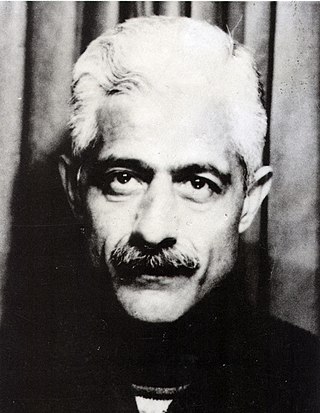
Eurocentrism refers to viewing the West as the center of world events or superior to all other cultures. The exact scope of Eurocentrism varies from the entire Western world to just the continent of Europe or even more narrowly, to Western Europe. When the term is applied historically, it may be used in reference to the presentation of the European perspective on history as objective or absolute, or to an apologetic stance toward European colonialism and other forms of imperialism.

In Marxist philosophy, cultural hegemony is the dominance of a culturally diverse society by the ruling class who shape the culture of that society—the beliefs and explanations, perceptions, values, and mores—so that the worldview of the ruling class becomes the accepted cultural norm. As the universal dominant ideology, the ruling-class worldview misrepresents the social, political, and economic status quo as natural, inevitable, and perpetual social conditions that benefit every social class, rather than as artificial social constructs that benefit only the ruling class.

Seyyed Jalāl Āl-e-Ahmad was a prominent Iranian novelist, short-story writer, translator, philosopher, socio-political critic, sociologist, as well as an anthropologist who was "one of the earliest and most prominent of contemporary Iranian ethnographers". He popularized the term gharbzadegi – variously translated in English as "westernstruck", "westoxification", and "Occidentosis" – producing a holistic ideological critique of the West "which combined strong themes of Frantz Fanon and Marx".
Modernization theory holds that as societies become more economically modernized, wealthier and more educated, their political institutions become increasingly liberal democratic. The "classical" theories of modernization of the 1950s and 1960s, most influentially articulated by Seymour Lipset, drew on sociological analyses of Karl Marx, Emile Durkheim, Max Weber, and Talcott Parsons. Modernization theory was a dominant paradigm in the social sciences in the 1950s and 1960s, and saw a resurgence after 1991, when Francis Fukuyama wrote about the end of the Cold War as confirmation on modernization theory.
The European New Right (ENR) is a far-right movement which originated in France as the Nouvelle Droite in the late 1960s. Its proponents are involved in a global "anti-structural revolt" against modernity and post-modernity, largely in the form of loosely connected intellectual communities striving to diffuse a similar philosophy within European societies.

Samir Amin was an Egyptian-French Marxian economist, political scientist and world-systems analyst. He is noted for his introduction of the term Eurocentrism in 1988 and considered a pioneer of Dependency Theory.
Intellectual movements in Iran involve the Iranian experience of modernity and its associated art, science, literature, poetry, and political structures that have been changing since the 19th century.

Emmanuel Todd is a French historian, anthropologist, demographer, sociologist and political scientist at the National Institute of Demographic Studies (INED) in Paris. His research examines the different family structures around the world and their relationship with beliefs, ideologies, political systems, and historical events. He has also published a number of political essays, which have received broad coverage in France.

Marcel Gauchet is a French historian, philosopher, and sociologist. He is professor emeritus of the Centre de recherches politiques Raymond Aron at the École des Hautes Études en Sciences Sociales and former head of the periodical Le Débat. Gauchet is one of France's most prominent contemporary intellectuals. He has written widely on such issues as the political consequences of modern individualism, the relation between religion and democracy, and the dilemmas of globalisation.
Foundations of Modern Arab Identity is a book-length study of the Nahda, or Arab Renaissance, by Arab American scholar Stephen Sheehi, that critically engages the "intellectual struggles that ensued when Arab writers internalized Western ways of defining themselves and their societies" in the mid-1800s.
Michel Clouscard was a French Marxist philosopher and sociologist. An opponent of capitalism, a critic of the evolution of ideas of progress confronted with the liberal mutations of the end of the 20th century, his work is linked to the thought of Rousseau, Hegel and Marx, whose links and unity he shows. He is known to have philosophically shown the collusion between capitalism and the French theory, represented by Lévi-Strauss and Deleuze, constructing his own concept of neo-Kantianism. He developed a philosophical research around the idea of social contract, postulating that "the constitutive principle of any society is the relation between production and consumption".
Postdevelopment theory holds that the whole concept and practice of development is a reflection of Western-Northern hegemony over the rest of the world. Postdevelopment thought arose in the 1980s out of criticisms voiced against development projects and development theory, which justified them.
Postcolonialism is the critical academic study of the cultural, political and economic legacy of colonialism and imperialism, focusing on the impact of human control and exploitation of colonized people and their lands. The field started to emerge in the 1960s, as scholars from previously colonized countries began publishing on the lingering effects of colonialism, developing a critical theory analysis of the history, culture, literature, and discourse of imperial power.
The March to Modernity, coined by Kishore Mahbubani in his 2008 book, "The New Asian Hemisphere: The Irresistible Shift of Global Power to the East", refers to Asia's modernization using and adapting the seven pillars of Western ideology, causing Asia to rise and to become the new global power. Asia's modernity was first achieved by Japan and India. Japan's success was emulated by the four economic tigers: South Korea, Taiwan, Hong Kong, and Singapore. China followed soon after by launching its "Four Modernizations" program. China's success of the past three decades in turn inspired the rise of India. Asians are marching to modernity.
The Budapest School was a school of thought, originally of Marxist humanism, but later of post-Marxism and dissident liberalism that emerged in Hungary in the early 1960s, belonging to so-called Hungarian New Left. Its members were students or colleagues of Georg Lukács. The school was originally oriented towards developing Lukács' later works on social ontology and aesthetics, but quickly began to challenge the paradigm of Lukácsian-Marxism, thus reconstructing contemporary critical theory. Most of the members later came to abandon Marxism. The school also critiqued the "dictatorship over needs" of the Soviet states. Most of the members were forced into exile by the pro-Soviet Hungarian government.

Inventing the Future: Postcapitalism and a World Without Work is a 2015 monograph by Nick Srnicek and Alex Williams, published by Verso Books.

Sophie Bessis is a Tunisian-born French historian, journalist, researcher, and feminist author. She has written numerous works in French, Spanish, and English on development in the Maghreb and the Arab world, as well as the situation of women denouncing the identity imprisonment to which they are subjected. She is the recipient of the Paris Liège literary prize and was honored as Commandeur of the Order of the Republic.

American Holocaust: Columbus and the Conquest of the New World is a multidisciplinary book about the Indigenous peoples of the Americas and colonial history written by American scholar and historian David Stannard.
The Apocalypse of Settler Colonialism: The Roots of Slavery, White Supremacy, and Capitalism in 17th Century North America and the Caribbean is a book by Gerald Horne. It is a historical analysis of the development of settler colonialism in North America and the Caribbean in the 17th century. Sarah Barber from the Lancaster University Department of History reviews the book and concludes "Writing accessible history is never easy, and this is a laudable addition." David Waldstreicher, Professor of History at the Graduate Center of the City University of New York, British colonizers committed counter-revolution—revolting against crown and against the threat from below—to increase their control over land and people.

The Dawning of the Apocalypse: The Roots of Slavery, White Supremacy, Settler Colonialism, and Capitalism in the Long Sixteenth Century is a book by Gerald Horne, a Professor of African American History at the University of Houston. The book offers a historical analysis of the development of settler colonialism in North America in the 16th century.











